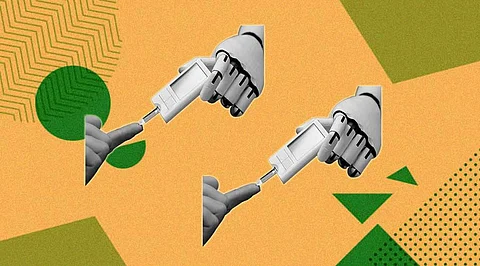
- Insights
- Cryptocurrencies
- Gadgets
- Stocks
- White Papers
- Reports
- Industry
- Geography
- Insights
- Cryptocurrencies
- Gadgets
- Stocks
- White Papers
- Reports
- Industry
- Geography


Diabetes is a global pandemic. Reports suggest around 425 million people worldwide have diabetes. It accounts for 12% of the world's expenditure. Diabetes can be of two types. Diabetes type I occurs in children who are unable to produce insulin themselves and therefore need additional insulin to survive and diabetes type II is driven by a sedentary lifestyle and obesity. Rapid advancements in Artificial Intelligence are benefitting the healthcare sector in multiple ways.
Artificial Intelligence can make advanced inferences based on a large amount of organized data and resources. By using AI in medicine, a flow can be obtained. This flow can be divided into input, analysis, and output. AI-based analytical tools consisting of machine learning and deep learning are used to obtain the target output. There are three fundamental objectives of using AI in Diabetes treatment and management:
The first AI-based medical device was 'Body Guardian' approved by the US Food and Drug Administration in 2012. Since then, various other countries like Japan, the USA, Europe, and China have advanced their AI-based medical tools regulations.
A proper dietary intake is crucial to maintaining blood glucose levels. Multiple software applications analyze the dietary content and provide patients with nutrition information and help patients in making healthy food choices. Deep Learning and remote communications technology analyze snaps of the patient's meal and assess nutrient intake. This support is almost similar to face-to-face nutritionist sessions. This technology not only enhances the effectiveness of dietary intervention in diabetic patients but also reduces the workload of human experts.
An active lifestyle also plays a crucial role in regulating and preventing diabetes. AI-based software using a decision support system with machine learning was proposed. This application was found to promote compliance with the physical activity and weight loss goals of the user. This change in mindset helped in maintaining weight and reducing the risks of developing diabetes.
Some of the upcoming gems of diabetes management technology range from insulin pumps to continuous glucose monitors and Artificial Pancreas or Automated Insulin Delivery (AID) systems.
Disclaimer: Analytics Insight does not provide financial advice or guidance. Also note that the cryptocurrencies mentioned/listed on the website could potentially be scams, i.e. designed to induce you to invest financial resources that may be lost forever and not be recoverable once investments are made. You are responsible for conducting your own research (DYOR) before making any investments. Read more here.
